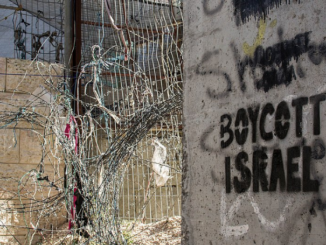
Israeli forces and settlers uprooted hundreds of olive trees Tuesday in the village of Bardala in the Jordan Valley and Yatta in the south of the West Bank, local sources said.
The Palestinian National Authority’s news agency, WAFA, reported that, according to sources, the Israeli army uprooted roughly 450 olive trees belonging in Bardala under the pretext that they were planted in state land. Jewish settlers, meanwhile, uprooted over 23 olive saplings in an area east of Yatta in the south of the occupied West Bank.
Israeli soldiers, settlers uproot olive trees in West Bank Via PIC PalinfoEn https://t.co/Q3tIuuMslt
— #FreePalestine ?? (@Taghreeba) February 6, 2019
Settlers from the illegal Jewish settlement of Ma’on uprooted the trees in an attempt to force Palestinians to leave their lands in favor of settlements projects and expansion, Rateb Jabour, coordinator of the National and Popular Committee in southern Hebron, told WAFA.
Both the Jordan Valley and the Yatta area are considered Area C which amounts to more than 60 percent of the occupied West Bank, which is under complete Israeli military control where Palestinians are not allowed to develop.
Last night’s destruction of Palestinians' olive trees by Israeli settlers was not just cruel but a direct violation of Jewish law: אין קוצצין אילני
מאכל; כל הקוצץ אילן מאכל דרך השחתה–לוקה.
משנה תורה, הל' מלכים ו' ח' pic.twitter.com/GkYa5Ute9k— Rabbi David Mivasair ? (@Mivasair) February 5, 2019
Destroying Palestinian olive trees, which take 10 years to bear fruit, and rendering the land unusable has been part of a long campaign of land claiming policy from Israel, which for decades has continued the construction of illegal settlements in Palestinian territories despite opposition from the United Nations and other international bodies, as well as many nations around the world.
The act of demolishing trees uproots Palestinians’ economic livelihoods, who rely on agricultural business and olive oil exports. In 2017, olive oil was the country’s fourth-largest export at US$35.4 million. Incidentally, Israel is one of the main destinations for Palestinian exports of olive oil, reaching US$770 million in the same year.
“ancient Palestinian olive trees are oppressed: entire groves regularly uprooted, chopped down, burned to charcoal by the Israeli army and settlers” https://t.co/svrxcCgMht
— Pierssy (@Pierssy) February 5, 2019
Though Palestinian olive oil is largely consumed domestically, the primary destination for the State of Palestine’s excess supply –an average of about 4,000 tons per year – had long been Israel, accounting for two-thirds of Israel’s imports of olive oil, according to The State of Palestine National Export Strategy: Olive Oil Sector 2014-2018. However, since the beginning of the second intifada, the export market has weakened.
In 2016, the U.N. Security Council said Jewish settlements have “no legal validity, constituting a flagrant violation under international law and a major obstacle to the vision of two States living side-by-side in peace and security, within internationally recognized borders.”
(TeleSur, PC, Social Media)








